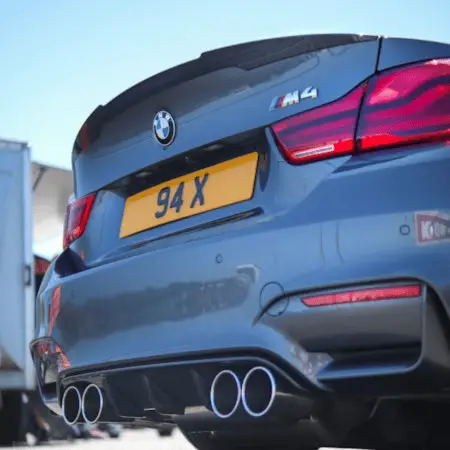Every component in the automobile plays a crucial role in ensuring smooth operation and safety. One such component is the muffler, often overlooked but significant for a vehicle’s functioning. But what happens if you drive without a muffler? Let’s delve into this topic and explore the implications of hitting the road sans muffler. So keep on reading…
Can You Drive Without a Muffler?
Yes, you can drive without a muffler, but it’s not a good idea. Driving without a muffler can make your car very loud and disturb others. Plus, it’s against the law in many places because mufflers help reduce noise pollution from vehicles. Driving without one might also damage your car’s engine in the long run because mufflers help control the flow of exhaust gases. So, keeping your muffler in good shape is best to stay safe and legal on the road.

Pros and Cons of Driving Without a Muffler
Mufflers are parts of a vehicle that reduce the noise made by the exhaust system. When an engine runs, it creates a lot of noise because of the gases it releases at high pressure. A muffler’s job is to quiet this noise. It does this by having a series of chambers or tubes that the exhaust gases pass through.
As they move through these chambers, their energy and noise levels decrease, which makes the vehicle quieter. Mufflers not only help in reducing noise but also help in controlling the back pressure of the engine, which can improve the vehicle’s efficiency and performance.
Driving without a muffler on your vehicle can have a mix of effects, some of which might seem beneficial at first glance but generally pose more disadvantages. Here’s a detailed look at the pros and cons:
Pros of Driving Without a Muffler
Increased Performance Perception: Some drivers believe that removing the muffler provides a small increase in horsepower or performance because it reduces back pressure in the exhaust system. This can sometimes be true for older vehicles but varies widely depending on the engine and vehicle design.
Enhanced Sound: For enthusiasts of performance cars, the louder, more aggressive exhaust sound that comes from not having a muffler is often desirable. It gives the vehicle a more “sporty” feel.
Cons of Driving Without a Muffler
Noise Pollution: The most significant downside is the increase in noise. Vehicles without mufflers are much louder, which can be a nuisance to the driver, passengers, and especially the community, potentially leading to noise complaints.
Legal Issues: Many regions have strict laws regarding vehicle noise levels. Driving without a muffler often breaches these laws, which can result in fines and the need for mandatory repairs.
Environmental Impact: Mufflers also help in reducing the emissions of harmful gases by controlling the exhaust flow. Without a muffler, a vehicle could emit more pollutants, contributing negatively to environmental health.
Potential Vehicle Damage: In some modern vehicles, the exhaust system is balanced with the muffler included. Removing it can disrupt this balance, possibly leading to a decrease in engine efficiency and longevity.
Decreased Resale Value: Cars that are modified by removing the muffler may be less appealing to potential buyers who prefer a quieter, more standard vehicle setup. This could affect the resale value negatively.
Alternatives to Mufflers
While traditional mufflers are designed to reduce noise from a vehicle’s exhaust, some alternatives can modify how a car sounds and performs without the same degree of sound suppression.
Performance Exhaust Systems
Performance exhaust systems are designed to enhance a vehicle’s power and efficiency while still reducing exhaust noise, though usually not as much as standard mufflers. These systems are engineered to have less restrictive airflow, which means they can help the engine perform better.
Performance exhausts are often made from high-quality materials that can withstand high temperatures and are less likely to corrode over time.
They provide a balance between sound enhancement and efficient exhaust flow, making them popular among car enthusiasts who want a more pronounced engine sound without excessive noise.
Muffler Delete vs. Straight Pipe
Muffler Delete: This is a simpler modification where just the muffler is removed from the vehicle’s existing exhaust system. The rest of the exhaust system remains intact. A muffler delete generally increases the sound of the exhaust system more than performance exhaust systems but less than a straight pipe. It is often cheaper than installing a full performance exhaust system.
Straight Pipe: Replacing the entire exhaust system with a pipe that has no restrictions is known as a straight pipe system. This setup includes removing the muffler and usually the catalytic converter (which is illegal in many places if driven on public roads). Straight pipes provide the maximum loudness and are often too loud for legal street use. They are preferred mostly for racing or off-road use, where noise regulations are less stringent.
Choosing between these options depends on what you value in a vehicle’s performance and sound. Performance exhaust systems offer a good blend of sound enhancement and performance improvement while staying functional and usually legal.
Muffler deletes offer a noticeable increase in sound without a significant investment but with less noise reduction.
Straight pipes provide the most sound and performance boost but at the risk of legal issues and potential fines. Each has its place depending on a car owner’s goals and local laws.

Tips for Muffler Maintenance
Maintaining your vehicle’s muffler is essential for ensuring it runs quietly and efficiently. Here are some practical tips for muffler maintenance:
- Check for Rust or Corrosion: Regularly inspect your muffler for signs of rust or corrosion, especially if you live in a climate where roads are salted in winter. Rust can eat through the metal, causing holes and cracks.
- Look for Damage: Examine the muffler for any dents, holes, or other damage. Physical damage can affect the performance of your exhaust system and increase noise.
- Be Alert to Noise Increases: Any new or louder noises coming from your exhaust system could indicate a problem with your muffler. A sudden increase in exhaust sound or a change in the sound quality often suggests there may be a hole or other damage.
- Check Mounting Brackets: Make sure that the muffler is securely mounted. Loose mounting brackets or hangers can lead to excessive vibration, which not only causes noise but can also lead to premature wear.
- Keep It Clean: Occasionally, it might be necessary to clean your muffler and exhaust system, especially if you drive in muddy or dirty conditions. Keeping the exterior of the muffler clean can help prevent rust and prolong its life.
- Seek Professional Advice: If you notice any serious issues, such as large holes or severe rust, it’s wise to take your vehicle to a professional. They can assess whether the muffler needs to be repaired or replaced.
- Minimize Short Trips: Frequent short trips can lead to water vapor accumulation in the exhaust system, which doesn’t always have time to evaporate fully. This can contribute to rusting over time. Try to drive long enough for the engine to reach its optimal operating temperature, which helps evaporate any moisture in the system.
- Upgrade If Necessary: If you live in a particularly harsh climate or if you’re experiencing frequent issues with your muffler, consider upgrading to a higher-quality, corrosion-resistant model.
By following these tips, you can help ensure your muffler remains in good condition, thus maintaining your vehicle’s performance and noise levels. Regular maintenance not only extends the life of the muffler but also helps in avoiding costly repairs down the road.
You May Find Helpful
- Is It Safe To Drive Without Power Steering?
- Battery Voltage Drops While Driving – Causes & What To Do
- Can You Drive With Bad Lifters? Explain In Detail
Conclusion
While it may be tempting to drive without a muffler for the sake of noise or performance, the risks far outweigh the benefits. Not only does it violate legal regulations and contribute to noise pollution, but it can also lead to vehicle damage and compromise safety. It’s essential to prioritize proper muffler maintenance and compliance with local laws to ensure a smooth and lawful driving experience.
